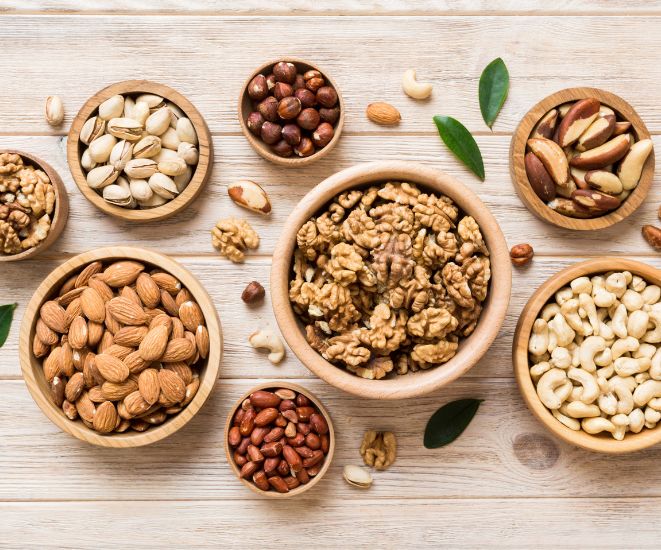Nourishing Your Body During a Major Life Transition
Menopause marks a significant shift in a woman's life. It comes with many uncomfortable symptoms such as hot flashes, mood swings and bone loss. Fortunately, nutrition can play a powerful role in managing these symptoms. Incorporating specific superfoods into your diet can provide essential nutrients that help alleviate discomfort and support overall health. Diet, along with medical treatment options like Estring, an estrogen therapy option, can help manage symptoms.
Superfoods for Menopause to Add to Your Diet
1. Soy
Soy is rich in isoflavones, a type of plant estrogen (phytoestrogen) that can mimic the effects of estrogen in the body. This is particularly beneficial during menopause, a time when estrogen levels naturally decline. Consuming soy products like tofu, tempeh or soy milk can help reduce the frequency and severity of hot flashes, improve bone health and support cardiovascular health, all of which are common concerns during menopause.
2. Flaxseeds
Flaxseeds are another excellent source of phytoestrogens, particularly lignans, which have been shown to help balance hormones during menopause. These tiny seeds are also packed with omega-3 fatty acids, which are known for their anti-inflammatory properties. Regular consumption of flaxseeds can help alleviate hot flashes, reduce the risk of heart disease and improve mood by stabilizing hormone levels.
3. Fatty Fish
Fatty fish such as salmon, mackerel and sardines are rich in omega-3 fatty acids, which have been linked to a reduction in menopausal symptoms like night sweats and mood swings. Omega-3s are also crucial for heart health, which becomes increasingly important as women age. Including fatty fish in your diet can help protect against heart disease, maintain healthy skin and support cognitive function during menopause.
4. Leafy Greens
Leafy greens like spinach, kale and Swiss chard are packed with essential vitamins and minerals, including calcium, magnesium and vitamin K. These nutrients are vital for bone health, which can be compromised during menopause due to declining estrogen levels. Eating plenty of leafy greens can help reduce the risk of osteoporosis, improve mood and support overall energy levels.
Related Search Topics (Ads)
5. Berries
Berries, such as strawberries, blueberries and raspberries, are rich in antioxidants and fiber. The antioxidants in berries help combat oxidative stress and inflammation, which can worsen menopausal symptoms. The high fiber content aids in digestion and helps regulate blood sugar levels, which can fluctuate during menopause. Regular consumption of berries can also support brain health and improve memory, which may decline with age.
6. Nuts
Nuts, including almonds, walnuts and Brazil nuts, are nutrient-dense and provide a good source of healthy fats, protein and fiber. They are also rich in magnesium, which is known to help with mood swings, sleep disturbances and bone health during menopause. Adding a handful of nuts to your daily diet can promote heart health, stabilize blood sugar and keep you feeling fuller for longer, reducing the likelihood of weight gain—a common concern during menopause.
7. Chia Seeds
Chia seeds are another superfood packed with omega-3 fatty acids, fiber and protein. They are particularly beneficial for digestive health, which can be disrupted during menopause. The fiber in chia seeds helps maintain regular bowel movements, reduces bloating and supports weight management. Additionally, the omega-3s in chia seeds can help reduce inflammation and support heart health.
8. Yogurt
Yogurt is an excellent source of calcium and vitamin D, both of which are critical for maintaining bone density during menopause. Probiotic-rich yogurt also supports gut health, which can influence everything from mood to immune function. Regular consumption of yogurt can help prevent osteoporosis, improve digestion and support overall wellness during menopause.
9. Quinoa
Quinoa is a high-protein grain that is also rich in magnesium, iron and fiber. It is particularly beneficial for women going through menopause because it helps regulate blood sugar levels, which can fluctuate due to hormonal changes. Quinoa’s high magnesium content also supports mood regulation and helps reduce the frequency of hot flashes. It’s a versatile food that can be used in a variety of dishes, making it easy to incorporate into your diet.
10. Turmeric
Turmeric, known for its bright yellow color and potent anti-inflammatory properties, is a powerful superfood for menopause. Curcumin, the active compound in turmeric, has been shown to reduce inflammation and support joint health, which can be particularly beneficial for women experiencing menopause-related aches and pains. Turmeric may also help with mood regulation and cognitive function, making it a valuable addition to a menopause-friendly diet.
Medical Treatment for Menopause
While superfoods can help manage menopause symptoms, some women may require additional medical treatment to find relief. Hormone replacement therapy (HRT) is one option, but not all women are candidates for this treatment. For those seeking non-systemic options, Estring is a low-dose, vaginally administered estrogen therapy. Estring specifically targets vaginal atrophy, which is a common menopause symptom characterized by dryness, itching and discomfort during intercourse. By delivering estrogen directly to the vaginal tissues, Estring helps restore moisture and elasticity without significantly affecting the rest of the body, making it a safer option for women who cannot take systemic estrogen.
Incorporating these superfoods for menopause into your diet, along with considering appropriate medical treatments, can help you manage menopause symptoms more effectively and maintain a high quality of life during this transition.

